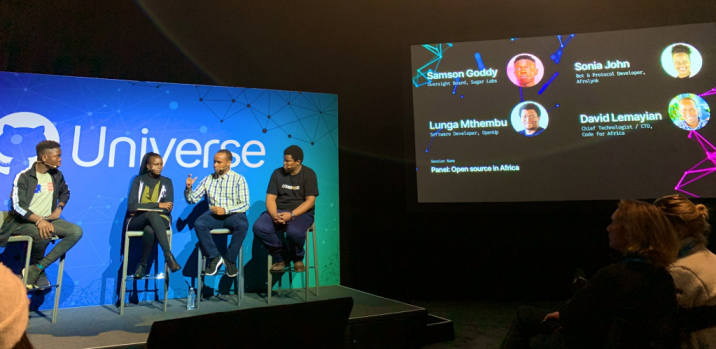Between 13th & 14th November I attended and participated in a panel at Github Universe 2019. If you are a frequent reader you'll know that, for the most part, alot of my blog covers the technicalities and mechanics of decentralized & distributed systems.
Occassionally, however, I have writen about past conferences, events I've attended, and trainings I've participated in or conducted. In today's post I want to hightlight some of my experience at this year's Github Universe starting with some of the highlights from the Keynote speeches.
Keynote Announcements
For the two days of the Github conference we attended two keynote sessions where Github team members, one after the other, presented the newest features and updates coming to Github in 2020. Among the features announced these are the ones I'm keen on interacting with:
- Github Mobile: Github for Mobile is a service we've long been looking forward to, coming with a dark mode option, its set up to be a great tool for developers on-the-go. Its my favorite feature because of its potential impact for developers and creators working in Africa. Enjoying an ever-growing increase in new mobile connections every year, its safe to believe more developers on the continent, will be able to access various products and services through this solution.
- Github Actions: Actions is a new Github feature which makes it easy to automate all software workflows with world-class CI/CD. Users can build, test, and deploy code right from GitHub, make code reviews, manage branches and more. An automated workflow comes with a built-in continuous integrationn service which will ensure continuous integration (CI) and continuous deployment (CD).
- Github Sponsors: This is the newest way to contribute on Github. With Sponsors, any GitHub user can sponsor any open source developer or organization in the program. Funding developers and organizations through GitHub Sponsors is one more way to contribute to open source projects you appreciate. Help projects get the resources they need, and recognize contributors working behind the scenes to make open source better for everyone.
- Arctic Code Vault: GitHub will be storing the planet's open-source software in the frozen Arctic for 1,000 years. The Arctic Code Vault as its known, is a data repository preserved in a very-long-term archival facility. GitHub will take a snapshot of all public code repositories, save it on film, and archive it 250 meters deep in the permafrost of an Arctic mountain. This project ensures data remains usable in a future world that may not have machines or knowledge to read it.
Adoption of Github mobile should result in an increase in technological solutions coming out of Africa, combined with utilization of Github Sponsors young developers and software creators will pursue software development as the viable tool to build the right technlogical solutions for the continent.
Besides the above, I'd also like to highlight the Notifications & Search functions expected updates. According to the two presentations, Notifications will offer a clean user experience which labels all incoming notifications based on type for example code review requests or mentions. The Code Search function will also be updated to offer higher search accuracy in turn lowering the number of search results and cutting down time spent during a code search.
Open Source in Africa Panel
Panel Session
At our panel session dubbed, "Open Source in Africa" I joined other panelists from various organizations and countries across africa to bring to Github the outlook for open source in Africa. As open source community players in our different industries, we came together to discuss the unique industry trends, seek new collaborators and highlight the adoption possibilities currently available for government institutions, corporations and organizations.

I focused on the economic models that we might need to develop if our objective of making open source software development a viable career option for programmers across the continent. The inclusion of an Africa-centric panel at this year's conference is a step towards embracing the continent and I'm keen to see how Github will move to improve its relationship with developers and creators.
Contributors Interview & Photoshoot Sessions
At the conference I was among those selected as an interviewee for a new Github magazine featuring open source contributors and maintainers. I answered questions about my journey into open source, mentioned maintainers I admire and discussed my programming mantra Knowing is not enough we must apply; to be willing is not enough we must do. Several speakers also enjoyed a personalised photoshoot, which could easily have been my favourite session during the conference.
Panels, Talks & Sponsor Booths
Besides the keynote sessions announcements, I attended other sessions that also drew my interest. I particularly enjoyed the: (i) "Good code documents itself" and other lies: Changing work culture through documentation session by Tania Allard, (ii) The code behind cars: How GitHub turned Ford into a software company session with Tim Carmean & Tom Erickson and (iii) Embracing open source in risk-averse organizations panel
At the conference I visited several booths presenting the various solutions for programmers. Among the booths I visited was the DaTree team who presented a tool to enforce development best practices, coding standards, and security policies on every commit.
Although this was my first Github Universe conderence I look forward to attending and participating at future GitHub universe conferences to stay up-to date on the development of open source and collaborative work across the world.